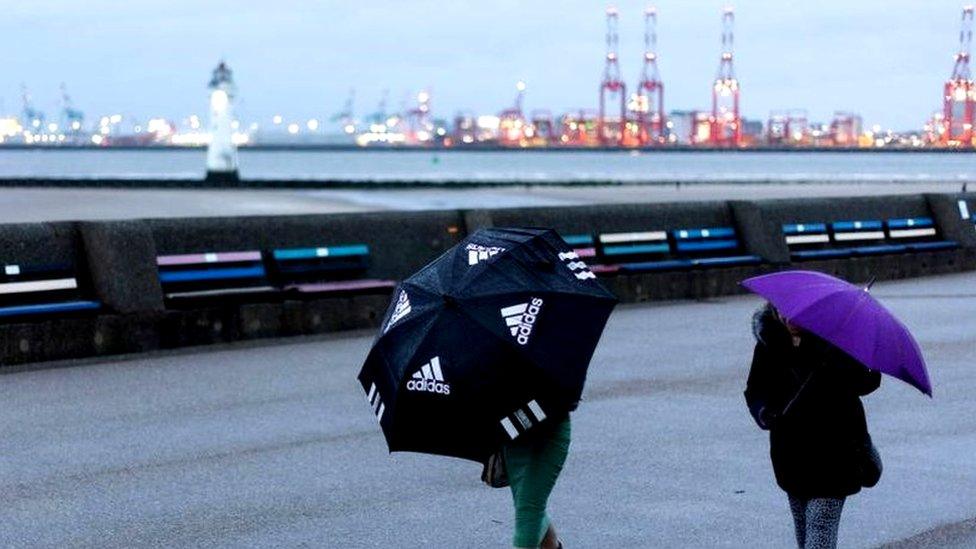Storm Isha: Two dead and thousands left without power
- Published
Watch: Dramatic videos show Storm Isha damage
Storm Isha has left thousands of people without power in the UK after bringing heavy rain and winds up to 99mph.
Scotland, Northern Ireland, north-west England and Wales were all badly hit, and some in remote areas were warned they may have no power until Tuesday.
Two people died, including a man in Scotland after the car he was in hit a fallen tree, and a man in Northern Ireland after a tree fell on his car.
Further disruption is expected as Storm Jocelyn approaches.
Amber warnings are in place across northern and western Scotland from 18:00 GMT on Tuesday as the storm develops in the wake of Isha.
In the most exposed areas, Jocelyn - the 10th named storm since September - is expected to bring gusts of wind of between 55 and 65mph (89 and 105km/h). And there will be yet more rainfall.
"We could see another 50-100mm of rain in the wettest parts," warned BBC Weather's Helen Willetts
Gust speeds are not forecast to top the levels seen during the height of Isha, which saw 99mph (159km/h) recorded by the Met Office at Brizlee Wood in Northumberland.
Transport Scotland said a gust of 107mph (172km/h) was recorded on the Tay Bridge in Dundee. Parts of the UK experienced their strongest winds in more than a decade.
Power outages affected about 53,000 homes at the height of the storm in Northern Ireland, where a man in his 60s was killed after a tree fell on his car in Limavady, County Londonderry.
By 21:00 GMT on Monday, about 13,000 customers were still without electricity, NIE Networks said.
In Cramlington, in Northumberland, a 26-year-old driver was left in critical condition after two cars hit a fallen tree early on Monday morning.
About 30,000 properties were left without power across England, Wales and Scotland, according to Energy Networks Association (ENA) - which represents energy providers - although many were reconnected to the network over the course of the day.
But Lawrence Slade, from ENA, said some properties might remain without power until Tuesday, particularly in remote areas.
He said it had been difficult to coordinate engineer teams because the storm had affected large swathes of the UK.
"We've got to get engineers out but we can only do that when it is safe, when the winds have dropped down sufficiently," Mr Slade told BBC Radio 4's Today programme on Monday.
Storm Jocelyn on the way for Tuesday
Hundreds of flights were cancelled on Sunday with planes heading to the UK forced to divert to France, Germany and the Netherlands, leaving passengers stranded in airports abroad.
Transport services largely recovered on Monday, though some roads remained closed and rail lines blocked leading to continued disruption through the rush hour.
ScotRail said its rail services would be suspended from 19:00 GMT on Tuesday due to Storm Jocelyn, with no rush hour services on Wednesday morning. The rail company tweeted, external that affected tickets could be used at other times this week.
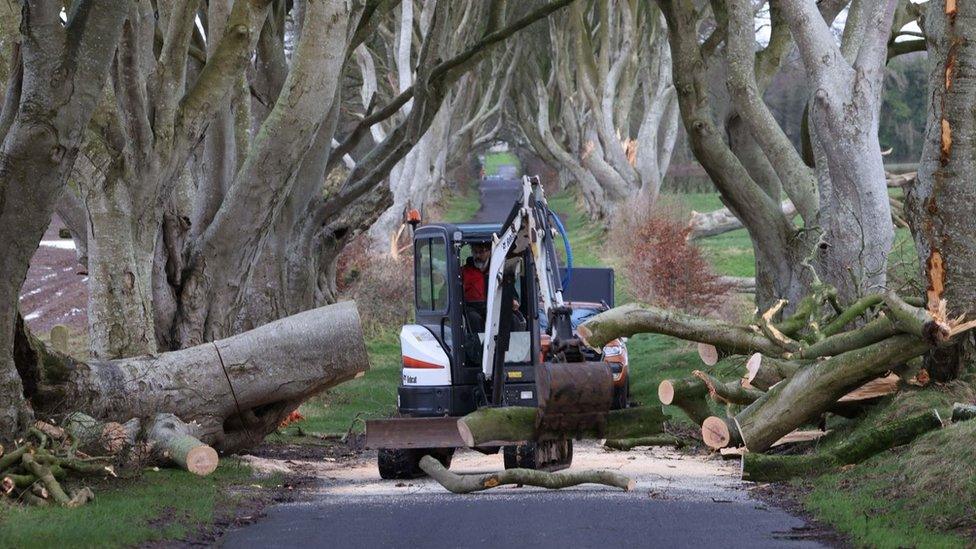
Some of County Antrim's iconic Dark Hedges trees - made famous by TV's Game of Thrones - were felled in the storm
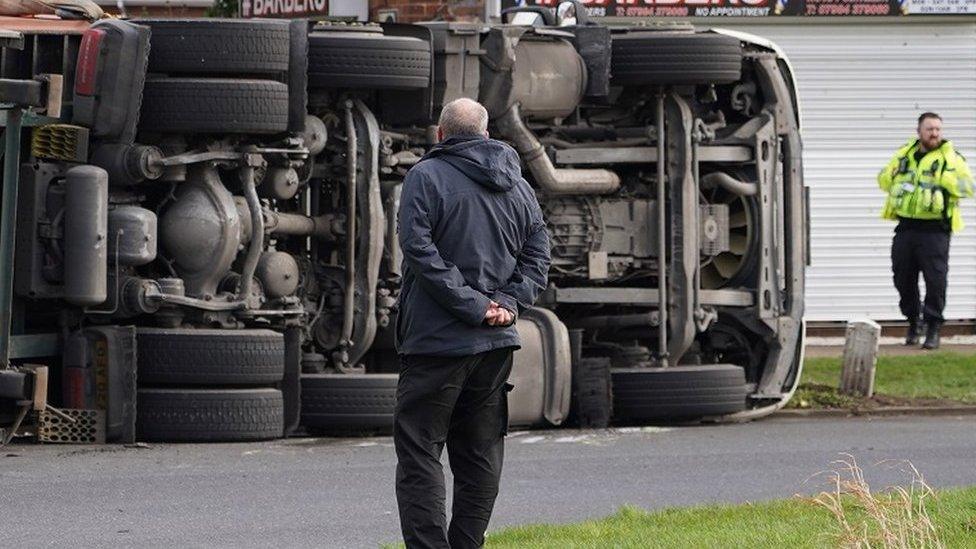
High-sided vehicles, including this one in Doncaster, were overturned by the winds
As Storm Jocelyn approaches, the Met Office amber warning for wind - the second highest - runs across parts of west and northern Scotland. Two other yellow warnings for the rest of Scotland, Northern Ireland, Wales and large parts of England have also been issued.
Meanwhile, there are yellow warnings for rain covering north-west England and the west coast of Scotland on Tuesday.
BBC Weather presenter Helen Willetts said: "Already the next area of rain is coming in to the north and west, that's Storm Jocelyn.
"The winds are expected to gust up to 70 or 80mp/h in the most exposed parts. It's going to be another spell of windy weather, wet weather as well."
Heavy rain this week could also lead to flooding, the Met Office said.
On Monday, the Environment Agency issued 19 flood warnings - where flooding is expected - and 85 flood alerts - where flooding is possible. More than 20 flood warnings were in place in Scotland.
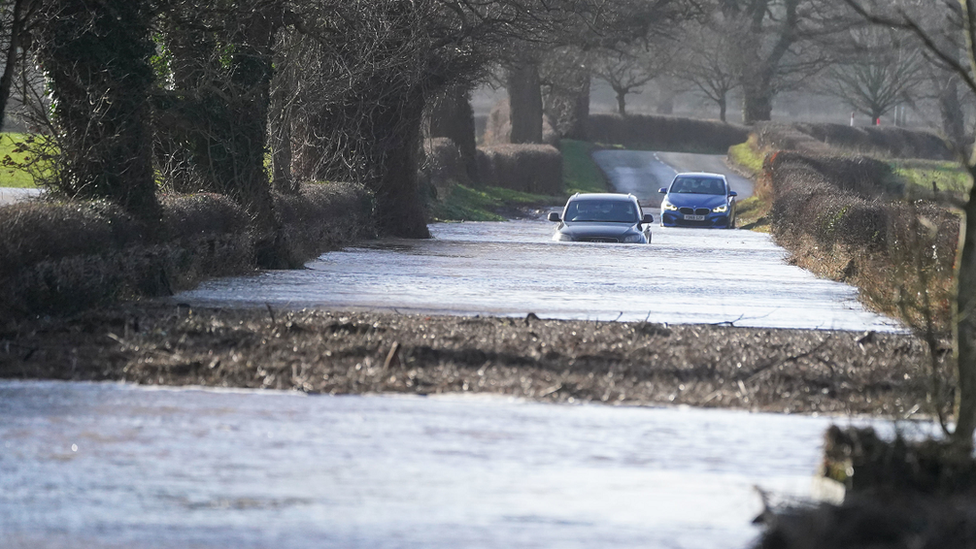
Several areas have been badly hit by flooding, including here at Warwick Bridge in Cumbria...
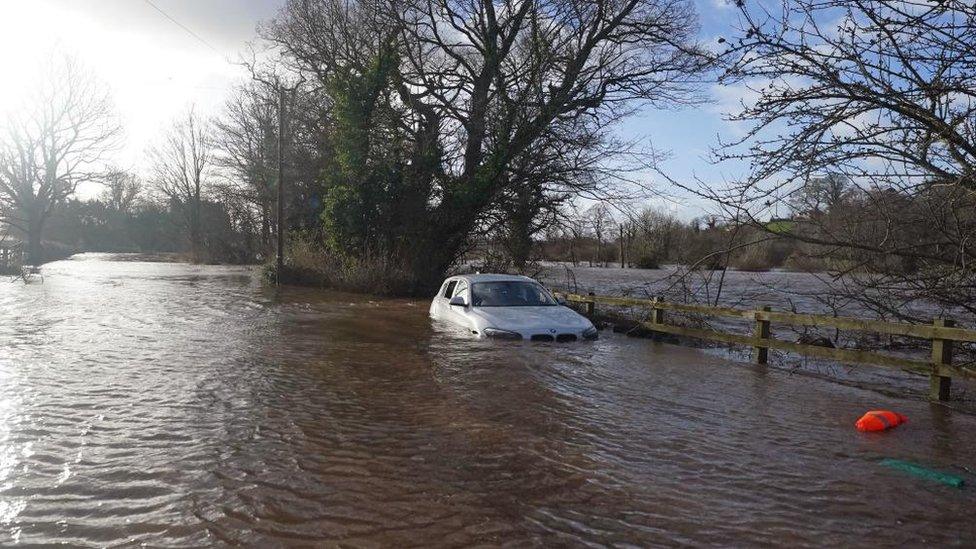
... where this unfortunate motorist became caught up in it
Storm Jocelyn becomes the 10th named storm of the season. If two more are named between now and August, it will mark a new record.
The Met Office names storms when they have the potential to cause disruption or damage. The agency says it is easier for people to follow the progress of a storm on TV, radio or social media if it has a name.
"In terms of naming storms, the UK has reached the letter 'H' earlier than in any previous season," BBC Weather presenter Darren Bett said.
"This season could see the highest number of storms since the naming of storms started in 2015. Coincidentally, it was that year that brought a record 11 storms - up to the letter K," he said.
Storm Jocelyn, however, was likely to pass a little further to the north of Scotland and not be as intense as Isha, he added.
The impact of climate change on the frequency of storms is unclear but a warming atmosphere makes extreme rainfall more likely. The world has warmed by about 1.1C since the industrial era began.

What preparations are you making for the storm? Have your travel plans been affected? Share your experiences by emailing haveyoursay@bbc.co.uk, external.
Please include a contact number if you are willing to speak to a BBC journalist. You can also get in touch in the following ways:
WhatsApp: +44 7756 165803
Tweet: @BBC_HaveYourSay, external
Please read our terms & conditions and privacy policy
If you are reading this page and can't see the form you will need to visit the mobile version of the BBC website to submit your question or comment or you can email us at HaveYourSay@bbc.co.uk, external. Please include your name, age and location with any submission.
Related topics
- Published22 January 2024

- Published5 April 2024
